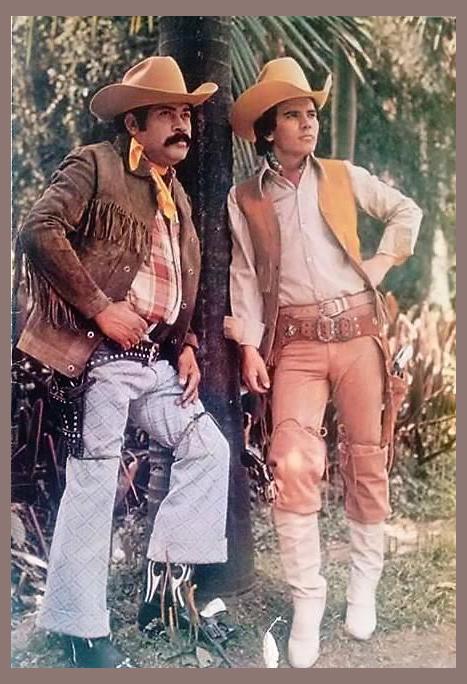 Tião Carreiro e Paraíso
Tião Carreiro e Paraíso
Tião Carreiro e Paraíso: Legends of Brazilian Sertanejo Music
In the annals of Brazilian music, Tião Carreiro e Paraíso stand as towering figures, their iconic song "Homem até debaixo d'água" echoing through generations and cementing their legacy as pioneers of sertanejo music.
Early Beginnings and Challenges:
Tião Carreiro, born Antônio Henrique de Lima, and Paraíso, born João Batista de Carvalho, first crossed paths in 1943. They shared a passion for the traditional music of their rural upbringing, and together, they began a musical journey fraught with challenges.
The fledgling duo faced skepticism and resistance from established musicians who deemed their music too rustic and unrefined. Undeterred, they persisted, honing their craft in remote taverns and small-town festivals.
Discography and Rise to Prominence:
In 1947, Tião Carreiro e Paraíso released their debut album, "Violas e Canções Sertanejas." The album's raw energy and heartfelt lyrics resonated with audiences, propelling the duo to wider recognition.
Over the following decades, they released numerous albums that showcased their eclectic repertoire, including classics such as "Boiadeiro Errante," "Pagode em Brasília," and "A Viola Enluarada." Their innovative use of the viola caipira, a traditional Brazilian guitar, became a defining characteristic of their sound.
Members and Controversies:
Tião Carreiro and Paraíso remained the core members of the band throughout their career. However, they were joined by various accompanists over the years, including guitarist José Fortuna and bassist João Mineiro.
Despite their immense popularity, Tião Carreiro e Paraíso were not immune to controversy. In 1972, they were accused of plagiarism over the song "Tristeza do Jeca." The allegations tarnished their reputation, but ultimately failed to diminish their musical impact.
Legacy and Cultural Significance:
Tião Carreiro e Paraíso's music transcended the boundaries of sertanejo and influenced generations of musicians. Their songs celebrated the rural lifestyle, the struggles of the working class, and the enduring spirit of the Brazilian people.
Their impact extended beyond music; they became symbols of Brazilian identity and served as ambassadors for their country. In 1990, they were awarded the Order of Cultural Merit by the Brazilian government.
Tião Carreiro passed away in 1993, while Paraíso followed suit in 2000. Their legacy continues to live on through their timeless music and the countless lives they touched with its simple yet profound beauty.
In the annals of Brazilian music, Tião Carreiro e Paraíso stand as towering figures, their iconic song "Homem até debaixo d'água" echoing through generations and cementing their legacy as pioneers of sertanejo music.
Early Beginnings and Challenges:
Tião Carreiro, born Antônio Henrique de Lima, and Paraíso, born João Batista de Carvalho, first crossed paths in 1943. They shared a passion for the traditional music of their rural upbringing, and together, they began a musical journey fraught with challenges.
The fledgling duo faced skepticism and resistance from established musicians who deemed their music too rustic and unrefined. Undeterred, they persisted, honing their craft in remote taverns and small-town festivals.
Discography and Rise to Prominence:
In 1947, Tião Carreiro e Paraíso released their debut album, "Violas e Canções Sertanejas." The album's raw energy and heartfelt lyrics resonated with audiences, propelling the duo to wider recognition.
Over the following decades, they released numerous albums that showcased their eclectic repertoire, including classics such as "Boiadeiro Errante," "Pagode em Brasília," and "A Viola Enluarada." Their innovative use of the viola caipira, a traditional Brazilian guitar, became a defining characteristic of their sound.
Members and Controversies:
Tião Carreiro and Paraíso remained the core members of the band throughout their career. However, they were joined by various accompanists over the years, including guitarist José Fortuna and bassist João Mineiro.
Despite their immense popularity, Tião Carreiro e Paraíso were not immune to controversy. In 1972, they were accused of plagiarism over the song "Tristeza do Jeca." The allegations tarnished their reputation, but ultimately failed to diminish their musical impact.
Legacy and Cultural Significance:
Tião Carreiro e Paraíso's music transcended the boundaries of sertanejo and influenced generations of musicians. Their songs celebrated the rural lifestyle, the struggles of the working class, and the enduring spirit of the Brazilian people.
Their impact extended beyond music; they became symbols of Brazilian identity and served as ambassadors for their country. In 1990, they were awarded the Order of Cultural Merit by the Brazilian government.
Tião Carreiro passed away in 1993, while Paraíso followed suit in 2000. Their legacy continues to live on through their timeless music and the countless lives they touched with its simple yet profound beauty.